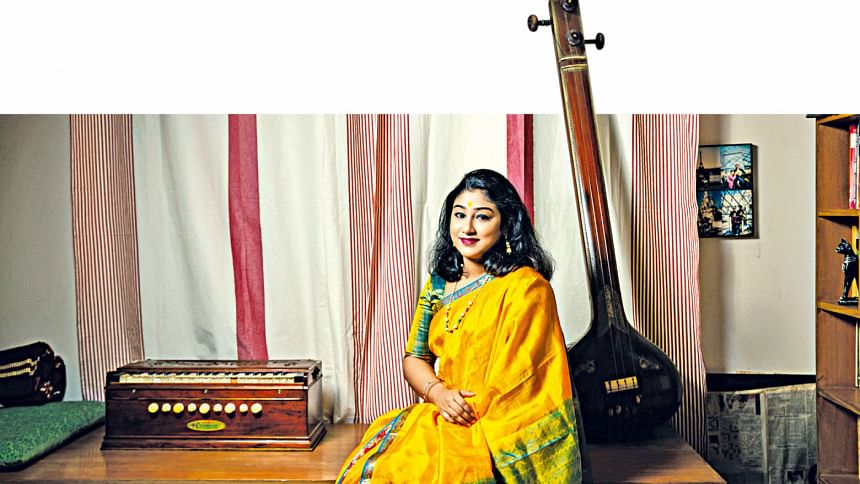The Tagore Songstress

Rafi Hossain: Welcome to Uncensored with Rafi Hossain. Today, we are here with the talented Rabindra Sangeet artist Shemonty Monjari. She is one of the greatest contemporary Rabindra Sangeet singers. Thank you so much for giving us your time today.
Shemonty Monjari: Thank you so much for having me here.
Rafi Hossain: Your guru is Mita Haque. Did you start under her instructions or did you have a teacher before her?
Shemonty Monjari: My teachings started from my father. Both my parents used to sing. My father used to do udichi and my mother used to learn Rabindra Sangeet. I used to go to Shurotirtho, Mita Haque's music school, with my mother as a child, and I picked up many songs from there. That is where I developed my interest. However, I didn't start learning from her properly during that time. When I enrolled in Chhayanaut, I became close to many people and learnt a lot. Then I started learning from Mita Haque.
Rafi Hossain: You might disagree with me on this but I feel that although Chhayanaut has a major role in leading a cultural movement and teaching many individuals, we don't see many artists developing. Why do you think that is so?

Shemonty Monjari: I have this question as well. Why are we not talking more about this? It is true that Chhayanaut doesn't want to move from their ideological place. I won't say that artists aren't being created because I do see many individuals of the new generation embracing Rabindra Sangeet, Nazrul Geeti, etc. Chhayanaut has given many people several platforms. When I was a student, it allowed me to showcase my talent in many platforms, which I would not have been able to do otherwise. The people of my generation who studied there and did well are more or less associated with performance now. In Chhyanaut's Pohela Boishakh event, they allow us to perform. I think the reason behind many individuals not performing, at the end of the day, is related to their personal preferences.
Rafi Hossain: Even if we consider other music schools, it seems to me that there is a large gap that exists between the numbers of the performers of the previous generations and of the newer generations. Why is that?
Shemonty Monjari: I'm not saying that the artists are not getting opportunities, but I think that because of the abundance of artists now, the space of exposure is lower than before.
Rafi Hossain: Do you want to stick with specialising in Rabindra Sangeet or explore different kinds of music if the opportunity arises?
Shemonty Monjari: I would love to explore different genres. I am already exploring a little. My interest developed with Rabindra Sangeet, but as I grew up, I realised I liked the music of the rest of the Pancha Kabis of Bengal as well. I like folk music too, but I don't think I can sing those songs. I also really love the songs of Sachin Dev Burman, and I'm slowly trying to learn and sing them. I'm trying to get out of my comfort zone.
Rafi Hossain: I feel that the newer generations are not invested in the music of the legendary musical figures of the past as much as the people of the previous generations were. Why do you think that may be?
Shemonty Monjari: I think that there are several factors. The music of the legendary figures are in this pattern of experimentation. I think that there needs to be a change in the presentation of such music to appeal to the younger audience. People are trying to take that music to a large audience through the television and media, including several programmes. I think that we should keep employing the digital world to further propagate the music.
Rafi Hossain: There is this stigma surrounding Chhayanaut graduates that they are very conservative when it comes to musical experimentation. Is it true for you?
Shemonty Monjari: When I went to India to create my album, my music director asked me if he could play around with the presentation because he thought I would be too conservative in this regard. I immediately said yes. I think that the presentation of a song is very important and how it's taken depends largely on the preferences of the listener.
Rafi Hossain: You balance your music, family and work really well. Does your husband also do music?
Shemonty Monjari: Yes, my husband also sings. He does both contemporary songs and Rabindra Sangeet, but due to work pressure, music is more like a hobby to us now.
Rafi Hossain: Did you study in Chhayanaut together?
Shemonty Monjari: No, I actually graduated in 2012. He joined later, but didn't continue it.
Rafi Hossain: As you mentioned previously, music is more like a hobby to you now. Is it because you aren't getting enough time?
Shemonty Monjari: That is one reason. But, the main reason behind it is that my throat has been in a bad condition for the past few months. I was even reluctant to come on your show today because I didn't know if I could sing properly. Aside from that, starting a new job does impose a lot of pressure on someone, and the fact that COVD-19 has made it work-from-home, adds more pressure. Whatever the case, I'm trying my best.
Rafi Hossain: Aside from teaching at Chhayanaut, do you have any music related desire you want to work towards?
Shemonty Monjari: If talking about my own music, I'm trying to improvise it more and make it so that it reaches a larger audience. I'm also trying to teach students outside of Chhayanaut. Other than that, I'm trying to learn and sing more music I'm fond of.
Rafi Hossain: If we consider our literature and culture, where do you think we are headed?
Shemonty Monjari: I have been noticing for a while that mediocre performers who have no education or training in music are releasing and performing music. Although I have no qualms about it, if people are listening to that kind of music for the first time, it may create a sense of confusion about the style. Anybody can release them on their personal profiles, but I feel that for large performances, the organisers should be more careful about maintaining the quality of the music because it would make a lot of people uncomfortable.
Rafi Hossain: Thank you again for being with us here today. Do you have a parting message for the readers?
Shemonty Monjari: Thank you, Rafi Bhai, The Daily Star and the people who have always been with me and supported me through thick and thin. I hope that they keep supporting me and that more people join them to listen to my music.

 For all latest news, follow The Daily Star's Google News channel.
For all latest news, follow The Daily Star's Google News channel. 



Comments